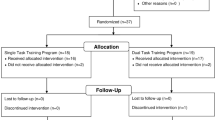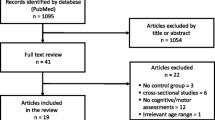Abstract
Background
Motor−cognitive dual-task training seems the most favorable form of exercise for functional and cognitive improvements in older individuals. The optimal exercise regime is still uncertain, and the potential benefits of qualitative parameters of exercise prescription such as feedback provision and practice variability are mostly unknown.
Aims
To verify the effects of a motor−cognitive dual-task training with feedback provision and variability of practice for improving functional ability and cognition in older individuals.
Methods
Thirty individuals (3 men) aged over 65 years were tested on walking speed, static and dynamic balance, lower limb strength, and cognition before and after a 5-week motor−cognitive intervention. Training consisted of twice weekly, 30 min gross−motor coordination exercises with variable practice conditions combined with stimulus–response cognitive tasks generated by an interactive device. Participants were divided into an experimental group and a control group, respectively receiving and nonreceiving feedback during training. A 2 × 2 ANOVA was used to verify the effects of training.
Results
Both groups improved static and dynamic balance (p < 0.05), walking speeds (p < 0.05), lower limb strength (p < 0.05) and cognitive functions with greater gains observed in the experimental group (p < 0.01).
Discussion
Variability of practice applied to motor−cognitive dual-task training is effective for improving, in only 5 weeks, functional ability and cognitive processing in older individuals. These changes were possibly afforded through motor and cognitive enhancement induced by exercise complexity. Provision of feedback seems to particularly benefit cognitive functions.
Conclusions
Brief motor−cognitive dual-task training using practice variability and feedback seems effective for counteracting the age-related cognitive and functional decline.


Similar content being viewed by others
Data availability
The authors have full control of all primary data and allow the journal to review our data if requested.
References
Manini TM, Pahor M (2008) Physical activity and maintaining physical function in older adults. Br J Sports Med 43:28–31. https://doi.org/10.1136/bjsm.2008.053736
Izquierdo M, Merchant RA, Morley JE et al (2021) International Exercise Recommendations in Older Adults (ICFSR): Expert Consensus Guidelines. J Nutr Health Aging 25:824–853. https://doi.org/10.1007/s12603-021-1665-8
Liu CJ, Latham NK (2009) Progressive resistance strength training for improving physical function in older adults. Cochr Database Syst Rev. https://doi.org/10.1002/14651858.CD002759.pub2
de Labra C, Guimaraes-Pinheiro C, Maseda A et al (2015) Effects of physical exercise interventions in frail older adults: a systematic review of randomized controlled trials. BMC Geriat 15:154. https://doi.org/10.1186/s12877-015-0155-4
Bouaziz W, Lang PO, Schmitt E et al (2016) Health benefits of multicomponent training programmes in seniors: a systematic review. Int J Clin Pract 70:520–536. https://doi.org/10.1111/ijcp.12822
Varela-Vásquez LA, Minobes-Molina E, Jerez-Roig J (2020) Dual-task exercises in older adults: A structured review of current literature. J Frailty Sarcopenia Falls 5:31–37. https://doi.org/10.22540/JFSF-05-031
Wollesen B, Voelcker-Rehage C (2014) Training effects on motor–cognitive dual-task performance in older adults A systematic review. Eur Rev Aging Phys Activity 11:5–24. https://doi.org/10.1007/s11556-013-0122-z
Garber CE, Blissmer B, Deschenes MR et al (2011) Exercise for developing and maintaining cardiorespiratory, musculoskeletal, and neuromotor fitness in apparently healthy adults: guidance for prescribing exercise. Med Sci Sports Exerc 43:1334–1359. https://doi.org/10.1249/MSS.0b013e318213fefb
Howe TE, Rochester L, Neil F et al (2011) Exercise for improving balance in older people. Cochrane Database Syst Rev. https://doi.org/10.1002/14651858.CD004963.pub3
Herrod PJ, Blackwell JE, Boereboom CL et al (2020) The time course of physiological adaptations to high-intensity interval training in older adults. Aging Med 3:245–251. https://doi.org/10.1002/agm2.12127
Brach JS, Van Swearingen JM, Perera S et al (2013) Motor learning versus standard walking exercise in older adults with subclinical gait dysfunction: a randomized clinical trial. J Am Geriatr Soc 61:1879–1886. https://doi.org/10.1111/jgs.12506
Schmidt R, Lee DT (2005) Motor Control and Learning: A Behavioural Emphasis (4th Edition). Human Kinetics, Leeds, United Kingdom
Lee TD (2012) Contextual interference: Generalizability and limitations. In: Hodges NJ, Williams AM (eds) Skill acquisition in sport: Research, theory and practice. Routledge, New York, pp 79–93
Pauwels L, Vancleef K, Swinnen SP et al (2015) Challenge to promote change: both young and older adults benefit from contextual interference. Front Aging Neurosci 7:157. https://doi.org/10.3389/fnagi.2015.00157
Carnahan H, Vandervoort AA, Swanson LR (1996) The influence of summary knowledge of results and aging on motor learning. Res Q Exerc Sport 67:280–287. https://doi.org/10.1080/02701367.1996.10607955
Sharma DA, Chevidikunnan MF, Khan FR et al (2016) Effectiveness of knowledge of result and knowledge of performance in the learning of a skilled motor activity by healthy young adults. J Phys Ther Sci 28:1482–1486. https://doi.org/10.1589/jpts.28.1482
Weir-Mayta P, Spencer KA, Bierer SM et al (2019) Investigation of feedback schedules on speech motor learning in older adults. Int J Aging Res 2:33. https://doi.org/10.28933/ijoar-2019-03-2006
Lajoie Y (2003) Effect of computerized feedback postural training on posture and attentional demands in older adults. Aging Clin Exp Res 16:363–368. https://doi.org/10.1007/BF03324565
Rose DJ, Clark S (2000) Can the control of bodily orientation be significantly improved in a group of older adults with a history of falls? J Am Geriatr Soc 48:275–282. https://doi.org/10.1111/j.1532-5415.2000.tb02646.x
Guadagnoli MA, Leis B, Van Gemmert AW et al (2002) The relationship between knowledge of results and motor learning in Parkinsonian patients. Parkinsonism Relat Disord 9:89–95. https://doi.org/10.1016/s1353-8020(02)00007-x
Chiviacowsky S, Campos T, Domingues M (2010) Reduced frequency of knowledge of results enhances learning in persons with Parkinson’s disease. Front Psychol 16:226. https://doi.org/10.3389/fpsyg.2010.00226
Nunes MES, Souza MGTX, Basso L et al (2014) Frequency of provision of knowledge of performance on skill acquisition in older persons. Front Psychol 5:1454. https://doi.org/10.3389/fpsyg.2014.01454
Nunes MES, Correa UC, Souza MGTX et al (2020) No improvement on the learning of golf putting by older persons with self-controlled knowledge of performance. J Aging Phys Act 27:300–308. https://doi.org/10.1123/japa.2018-0053
de Haan T, van den Berg B, Woldorff MG et al (2021) Diminished feedback evaluation and knowledge updating underlying age-related differences in choice behavior during feedback learning. Front Hum Neurosci. https://doi.org/10.3389/fnhum.2021.635996
Nachmani H, Paran I, Salti M et al (2021) Examining different motor learning paradigms for improving balance recovery abilities among older adults, random vs. block training-study protocol of a randomized non-inferiority controlled trial. Front Hum Neurosci. https://doi.org/10.3389/fnhum.2021.624492
Dick MB, Hsieh S, Dick-Muehlke C et al (2000) The variability of practice hypothesis in motor learning: does it apply to Alzheimer’s disease? Brain Cogn 44:470–489. https://doi.org/10.1006/brcg.2000.1206
Czyż SH (2021) Variability of Practice, Information Processing, and Decision Making-How Much Do We Know? Front Psychol. https://doi.org/10.3389/fpsyg.2021.639131
Sabah K, Dolk T, Meiran N et al (2019) When less is more: costs and benefits of varied vs. fixed content and structure in short-term task switching training. Psychol Res 83:1531–1542. https://doi.org/10.1007/s00426-018-1006-7
Pesce C (2012) Shifting the focus from quantitative to qualitative exercise characteristics in exercise and cognition research. J Sport Exerc Psychol 34:766–786. https://doi.org/10.1123/jsep.34.6.766
Nasreddine ZS, Phillips NA, Bédirian V et al (2005) The Montreal Cognitive Assessment, MoCA: a brief screening tool for mild cognitive impairment. J Am Geriatr Soc 53:695–699. https://doi.org/10.1111/j.1532-5415.2005.53221.x
Innocenti A, Cammisuli DM, Sgromo D et al (2017) Lifestyle, physical activity and cognitive functions: the impact on the scores of Montreal Cognitive Assessment (MoCa). Arch Ital Biol 155:25–32. https://doi.org/10.12871/000398292017123
Dautzenberg G, Lijmer J, Beekman A (2020) Diagnostic accuracy of the Montreal Cognitive Assessment (MoCA) for cognitive screening in old age psychiatry: Determining cutoff scores in clinical practice. Avoiding spectrum bias caused by healthy controls. J Geriatr Psychiatry. https://doi.org/10.1002/gps.5227
Forte R, De Vito G, Boreham CAG (2021) Reliability of walking speed in basic and complex conditions in healthy, older community-dwelling individuals. Aging Clin Exp Res 33:311–317. https://doi.org/10.1007/s40520-020-01543-x
Alcazar J, Losa-Reyna J, Rodriguez-Lopez C et al (2018) The sit-to-stand muscle power test: An easy, inexpensive and portable procedure to assess muscle power in older people. Exp Gerontol 112:38–43. https://doi.org/10.1016/j.exger.2018.08.006
Yogev-Seligmann G, Hausdorff JM, Giladi N (2008) The role of executive function and attention in gait. Mov Disord 23:329–342. https://doi.org/10.1002/mds.21720
Forte R, Boreham CA, De Vito G et al (2014) Measures of static postural control moderate the association of strength and power with functional dynamic balance. Aging Clin Exp Res 26:645–653. https://doi.org/10.1007/s40520-014-0216-0
Rikli RE, Jones CJ (1999) Development and validation of a functional fitness test for community-residing older adults. JAPA 7:129–161. https://doi.org/10.1123/japa.7.2.129
Nets Y (2019) Is there a preferred mode of exercise for cognition enhancement in older age?: a narrative review. Front Med 6:57. https://doi.org/10.3389/fmed.2019.00057
Li KZ, Roudaia E, Lussier M et al (2010) Benefits of cognitive dual-task training on balance performance in healthy older adults. J Gerontol A Biol Sci Med Sci 65:1344–1352. https://doi.org/10.1093/gerona/glq151
Pichierri G, Wolf P, Murer K et al (2011) Cognitive and cognitive-motor interventions affecting physical functioning: a systematic review. BMC Geriatr 11:29. https://doi.org/10.1186/1471-2318-11-29
Macaluso A, De Vito G (2004) Muscle strength, power and adaptations to resistance training in older people. Eur J Appl Physiol 91:450–472. https://doi.org/10.1007/s00421-003-0991-3
Krishnan K, Rossetti H, Hynan LS et al (2017) Changes in Montreal Cognitive Assessment Scores Over Time. Assessment 24:772–777. https://doi.org/10.1177/1073191116654217
Godde B, Voelcker-Rehage C (2017) Cognitive resources necessary for motor control in older adults are reduced by walking and coordination training. Front Hum Neurosci 11:156. https://doi.org/10.3389/fnhum.2017.00156
Pesce C, Croce R, Ben-Soussan TD et al (2016) Variability of practice as an interface between motor and cognitive development. Int J Sport Exer Psychol 17:133–152
Diamond A (2000) Close Interrelation of Motor Development and Cognitive Development and of the Cerebellum and Prefrontal Cortex. Child Dev 71:44–56
Acknowledgements
The authors wish to thank Dr Francesca Brienza of UISP Roma for recruitment of participants, and Microgate S.r.l, Bolzano for supplying the training devices.
Author information
Authors and Affiliations
Contributions
All authors contributed to the study conception and design. Material preparation, data collection and analysis were performed by RF, FDR, SL, MA. Training and testing of participants were performed by NT, SL, CT. The first draft of the manuscript was written by RF and all authors commented on previous versions of the manuscript. All authors read and approved the final manuscript. The authors have full control of all primary data and allow the journal to review our data if requested.
Corresponding author
Ethics declarations
Conflict of interests
On behalf of all authors, the corresponding author states that there is no conflict of interest.
Ethical approval
The study received approval by the board for research of the local university (Committee for the Authorization of Departmental Research (CAR) approval code CARD-74/2020), Università di Roma Foro Italico.
Human and animal rights
The study has been performed in accordance with the ethical standards as laid down in the 1964 Declaration of Helsinki and its later amendments.
Informed consent
All participants signed informed consents before the assessments.
Additional information
Publisher's Note
Springer Nature remains neutral with regard to jurisdictional claims in published maps and institutional affiliations.
Rights and permissions
Springer Nature or its licensor (e.g. a society or other partner) holds exclusive rights to this article under a publishing agreement with the author(s) or other rightsholder(s); author self-archiving of the accepted manuscript version of this article is solely governed by the terms of such publishing agreement and applicable law.
About this article
Cite this article
Forte, R., Trentin, C., Tocci, N. et al. Motor−cognitive exercise with variability of practice and feedback improves functional ability and cognition in older individuals. Aging Clin Exp Res 35, 2797–2806 (2023). https://doi.org/10.1007/s40520-023-02568-8
Received:
Accepted:
Published:
Issue Date:
DOI: https://doi.org/10.1007/s40520-023-02568-8




